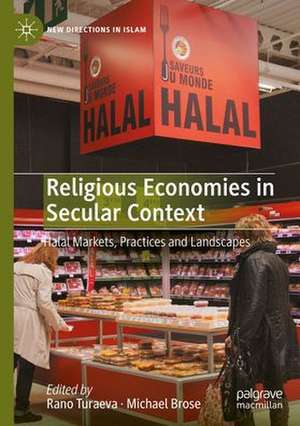Religious Economies in Secular Context: Halal Markets, Practices and Landscapes: New Directions in Islam
Editat de Rano Turaeva, Michael Broseen Limba Engleză Hardback – 10 dec 2023
Preț: 891.65 lei
Preț vechi: 1087.38 lei
-18% Nou
Puncte Express: 1337
Preț estimativ în valută:
170.62€ • 182.45$ • 142.26£
170.62€ • 182.45$ • 142.26£
Carte tipărită la comandă
Livrare economică 18 aprilie-02 mai
Preluare comenzi: 021 569.72.76
Specificații
ISBN-13: 9783031186028
ISBN-10: 3031186028
Pagini: 241
Ilustrații: XV, 241 p. 9 illus., 8 illus. in color.
Dimensiuni: 148 x 210 mm
Greutate: 0.46 kg
Ediția:1st ed. 2023
Editura: Springer International Publishing
Colecția Palgrave Macmillan
Seria New Directions in Islam
Locul publicării:Cham, Switzerland
ISBN-10: 3031186028
Pagini: 241
Ilustrații: XV, 241 p. 9 illus., 8 illus. in color.
Dimensiuni: 148 x 210 mm
Greutate: 0.46 kg
Ediția:1st ed. 2023
Editura: Springer International Publishing
Colecția Palgrave Macmillan
Seria New Directions in Islam
Locul publicării:Cham, Switzerland
Cuprins
1. Halal certification in Russia, Izzat Amon.- 2.Measuring the Unmeasurable: Production & Certification of Halal Goods and Services in Central Asia, Botoeva Aysalkun- 3. Environmental Studies, Skidmore College, US: “Halal and Tayyib; Rethinking the Ethical in a Genetically Modified World, Nurcan Atalan-Helicke.- 4. The Everyday Politics of Halal Development and Governance at the National Commission on Muslim Filipinos, Fauwaz Abdul Aziz.- 5. Making Halal Business in Southern Kazakhstan: Combining the Soviet and Sufi Legacies, Yana Pak.- 6. Bacon or beef? “Fake” halal scandals in the Russia Federation: Consolidating halal norms through secular courts, Silvia Serrano.- 7. Spectres of Qingzhen: Marking Islamic Food in China, Guangtian Ha.- 8. Halal Industry of Ukraine in the Period of Independence, Brylov Denis.- 9. Neoliberal Standards and Trust: Halal Certification and Intra-Muslim Trade in South Africa, Shaheed Tayob.- 10. From 'Halal’ Marketing to 'Islamic' Management?: The Case Study of the Halal Supermarket ‘Le Triangle' in France, Ayang Utriza YAKIN.- 11. Michael Brose. Indiana University.- 12. Halal Landscapes of Dagestan in Russia, Iwona Kaliszewska.
Notă biografică
Rano Turaeva is a Habilitating Candidate at the Ludwig Maximillian University and an associated researcher at Max Planck Institute for Social Anthropology in Halle Saale, Germany.
Michael Brose is Professor of Practice, Central Eurasian Studies, at Indiana University, UK. He researches, publishes and teaches in two areas of Chinese history and society, Mongol China social history, and the history and current role of Islam in South West China.
Textul de pe ultima copertă
This edited collection is one of the few sociological and anthropological studies of Halal markets. The chapters inquire into the legal and religious aspects of Halal markets in non-Muslim contexts or the countries where the label 'Halal' matters, and is not taken for granted as it is the case in most of the Muslim world where it is an accepted norm. In many countries, 'Halal' has become a type of brand used to market food and cosmetic products. This is an effective marketing strategy because it appeals directly to Muslims, but also increasingly to non-Muslims who seek pure, fresh products. In this case 'Halal' implies attributes similar to other brands where quality and purity is guaranteed, such as Fair Trade, Bio or organic in the US and Europe, but with the additional appeal to prospective Muslim consumers that it satisfies Islamic norms.The book consists of contributions on Halal economies in non-Muslim societies dealing with such dilemmas as rational thinking and halal philosophywithin various fields of halal economy such as regulation, production, marketing, service delivery and consumption.
Rano Turaeva is a Habilitating Candidate at the Ludwig Maximillian University and an associated researcher at Max Planck Institute for Social Anthropology in Halle Saale, Germany.
Michael Brose is Professor of Practice, Central Eurasian Studies, at Indiana University, UK. He researches, publishes and teaches in two areas of Chinese history and society, Mongol China social history, and the history and current role of Islam in South West China.
Caracteristici
Contributes to the field of moral economies and sociology and anthropology of markets Contains diverse ethnographic and empirical material Discusses timely issues such as the semiotics of halal in relation to the state crackdown on Islam in China










